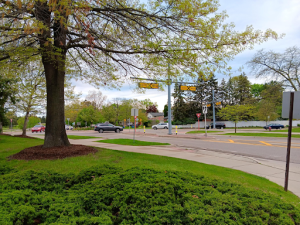Romeo and Juliet: Written by Shakespeare or Not
Is Shakespeare, Shakespeare? Could Edward de Vere’s authorship be possible?
April 26, 2023
Fashionable, lonely, colorful, and generous. All random words with only one thing in common, William Shakespeare (1564-1616). He is the source of these daily-used adjectives. Shakespeare was also the source of some of the most charming and pulchritudinous works of literature. However, some believe that the origin of these famous compositions and plays were written, not by Shakespeare, but by the one and only, Edward de Vere. Impossible! How could Edward de Vere, the 17th Earl of Oxford, be responsible for 37 celebrated plays and 154 acknowledged sonnets? Could his authorship be possible?
Some scholars believe it is possible. De Vere’s admirable education together with his personal affiliations with the inner court has convinced some avid Shakespeare enthusiasts and several august individuals, such as Walt Whitman or Derek Jacobi, that De Vere is in fact “Shakespeare.” Other pieces of evidence for De Vere’s authorship, include the circumstances that De Vere’s uncle Arthur Golding translated a play composed by Shakespeare, Venus and Adonis, which he dedicated to De Vere. Furthermore, De Vere’s bible, had notes highlighted and emphasized, that associate with Shakespeare’s verses; all these clues point to De Vere, and not Shakespeare, as the writer of those 37 plays and 154 acknowledged sonnets.
While these theories might be compelling, there are plenty that mention Shakespeare being authentic to his identity. One of those theories during the Elizabethan Era, the custom was not to publish one’s name on literary creations, the custom Shakespeare followed, until in 1598, there was an exception. Shakespeare’s name was being used, in fact his name was spelled 2 different ways, showing that he did not really care. If “Shakespeare” really had initiated a separate identity, he would’ve been more consistent with the spelling of his name. Adding on to this theory, the practice back then was to publish anonymously rather than pseudonymously. This is further evidence that De Vere was not the writer. Since there was an established stigma, that a nobleman needed to conceal their identity as writing plays brought shame. Which makes us wonder: why would De Vere use a pseudonym and not publish anonymously?
Another group of theories supporting Shakespeare involves collaborations; a common concept at the time. Records have proved that around half of Shakespeare’s final ten plays were produced with collaborators, for ex. Two Noble Kinsmen was written in collaboration with John Fletcher. It has also been determined that Shakespeare’s initial plays were also collaborations with actors or poets. For ex, Henry VI, Part 1 was written with either Thomas Nashe or Thomas Kyd and Titus Andronicus with George Peele. However, in spite of the standard aspect of collaborations which still appeals to this contemporary period, it is at odds that if a nobleman, like De Vere was trying to discreetly publish their works and plays, the collaborations would have not occurred, because it would risk the inevitable ignominy faced by nobles in the theater.
Finally, how could a nobleman isolated from the actors and the theater, be aware of these slight features while writing the plays, which would be taking a certain level of physical association with these factors. While Shakespeare was influencing literature at his time, he was a shareholder of multiple theaters, and was directed to compose the plays. This entailed the constant presence of Shakespeare at these stages, so mistakes would not transpire. In addition, past documents presented evidence that Shakspeare wrote actor and stage specific sections, not pursuing the standard practice of character-specific parts. In 1610, Shakespeare’s previous theater’s location was transferred to Blackfriars, which involved a down-scale in size for the stage. This resulted in Shakespeare having to be strict on the elements of the stage, since missteps would consequently result in loss of revenue. In other words, it is implausible a nobleman writing that far away could perceive such essentials and such specific plays.
In conclusion, relating to Shakespeare’s authorship, they all point to these main questions, Why publish pseudonymously instead of anonymously? Why collaborate with a known actor? How does a nobleman write including details without being there?, it doesn’t quite piece together. Each conspiracy, theory, possibility, hypothesis, and candidate for Shakespeare, when scrutinized, contain no empirical evidence. And all go back to the original author: William Shakespeare the origin of alluringly woven literature. And said by Shakespeare, himself, “To be, or not to be: that is the question.”
And to answer that: to be.







